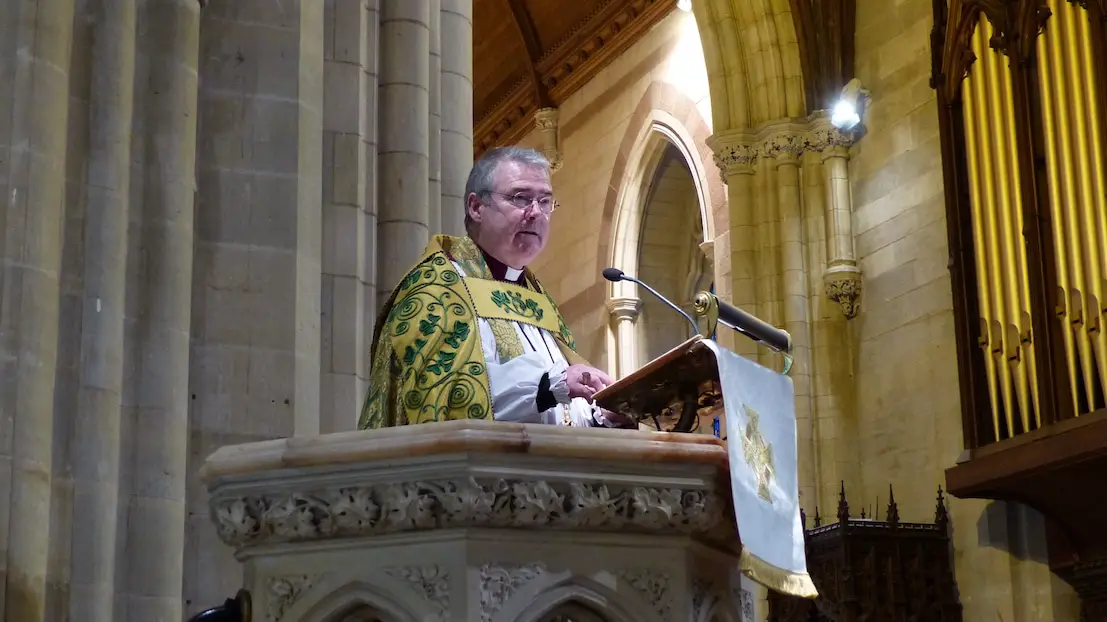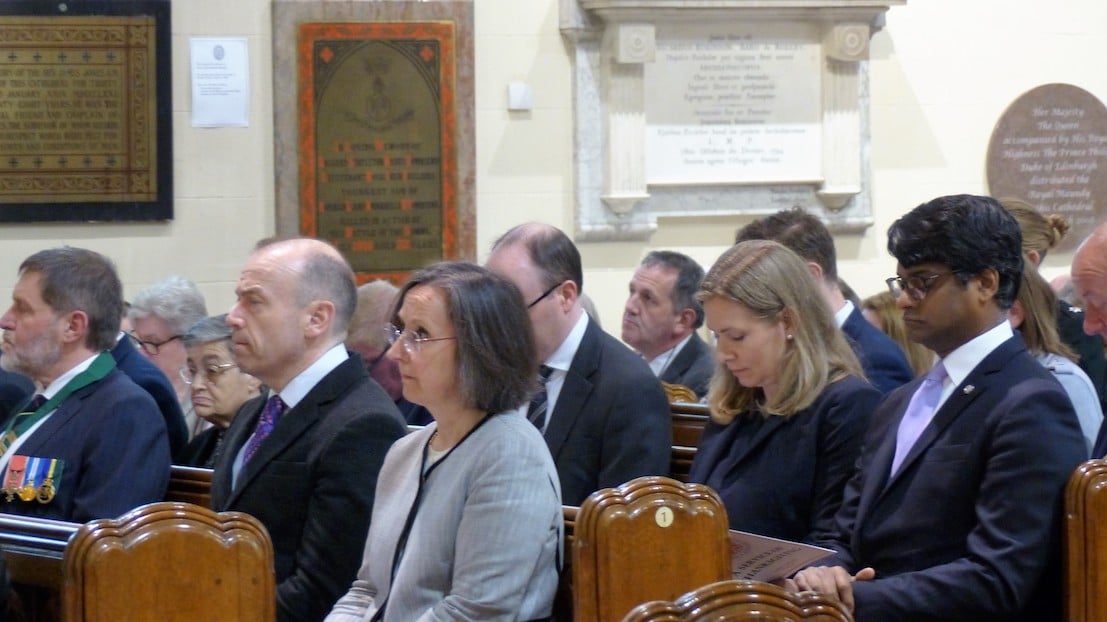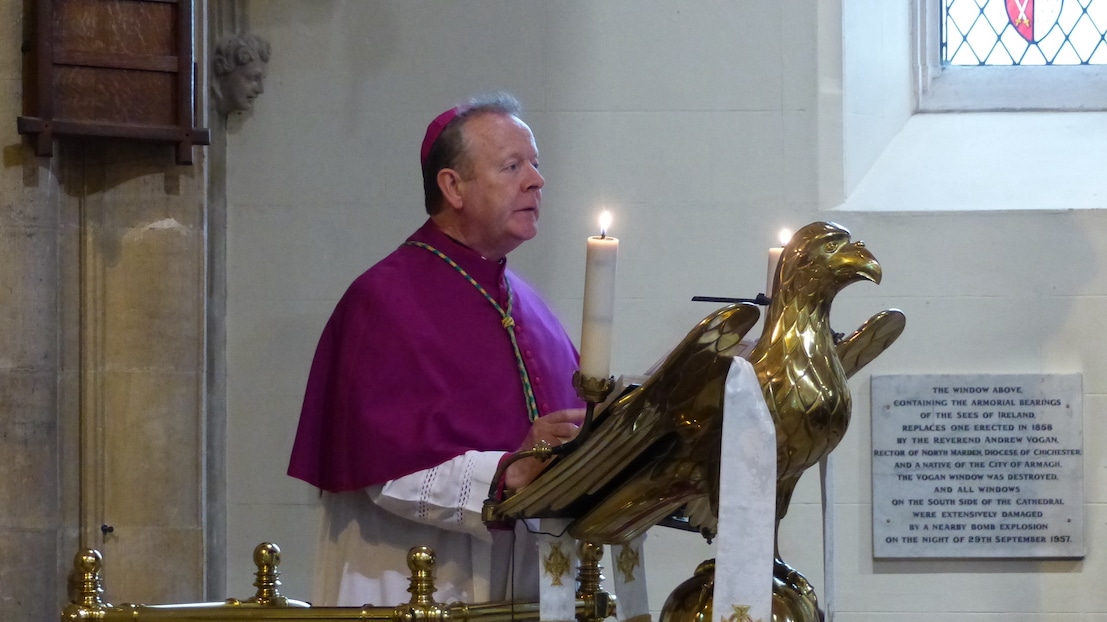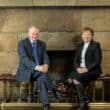
The Archbishop of Armagh and Primate of All Ireland, the Most Rev John McDowell, is honoured to have been asked to present the Sovereign’s Orb at the Coronation Service of King Charles III and Queen Camilla in Westminster Abbey on Saturday.
The invitation to take part in the Coronation Service was made on behalf of Their Majesties the King and Queen and the Archbishop of Canterbury on account of Archbishop McDowell’s position as Archbishop of Armagh, the most senior Anglican Bishop in the Church of Ireland.
It is also “in recognition of the great service you have given warmly and wholeheartedly to your Province, the Church, and The Communion, as well as your significant contributions to public life”.
The Archbishop’s role in the coronation involves receiving the Sovereign’s Orb from the Dean of Westminster and taking it to the Archbishop of Canterbury.
It is he who will place it in the King’s hand, with the words: “Receive this Orb, set under the Cross, and remember always the kingdoms of this world are become the kingdoms of our Lord, and of his Christ.”
The Archbishop said he was “delighted and honoured” to have been invited to present the Sovereign’s Orb at the Coronation Service. This will be the first time that this part of the ceremony has been undertaken by anyone other than the Archbishop of Canterbury.
He remarked: “When I do so I will have the prayers of all the people of Northern Ireland in my heart.”
Confirmation comes of the Archbishop’s invitation comes two days after he preached at a special service in St Patrick’s Church of Ireland Cathedral.
With a large congregation in St Patrick’s Cathedral on the Hill of Armagh, the Service of Thanksgiving took place on Tuesday evening in preparation for this Saturday’s Coronation of King Charles III and Queen Camilla.
Those attending the service included the Secretary of State for Northern Ireland, the Rt Hon Chris Heaton-Harris MP, US Consul-General Paul Narain, and Mr Mark Hanniffy, Irish Joint Secretary of the North/South Ministerial Council, along with church and civic representatives from across Armagh City, Banbridge and Craigavon Borough.

Secretary of State and US Consul General at the Coronation Service in Armagh on Tuesday.
The sermon was given by Archbishop John McDowell with Bible readings by Archbishop Eamon Martin and Richard Hamilton-Stubber, Vice Lord-Lieutenant for Armagh, and prayers by members of the local community. The Cathedral Choir sang a number of pieces of music sung at past Coronation Services including Handel’s famous anthem Zadok the Priest.
In the course of his sermon, Archbishop McDowell referred the sermon for the Coronation in 1689 of King William III whose accession marked a step in the evolution of modern constitutional monarchy.
He remarked: “Of course, King Charles III will have much less real power than William III had, but the power of his patronage and particularly the potency of his example will be very extensive. And how he uses that patronage and that power will be important for us in this place, because the King has shown himself to be a friend of Northern Ireland – indeed of Ireland North and South – with a very detailed knowledge of our affairs, and more importantly, we have a place close to his heart.”
Archbishop McDowell noted that constitutional monarchy in the United Kingdom has at least two crucial features – being a religious office with the anointing being the most solemn and sacred part of the Coronation ceremony.
He said: “One day all institutions – monarchy, Parliament, the Church – will be no more for the kingdoms of this world will become the kingdom of God and of his Christ; and he shall reign for ever and ever,” Archbishop John continued. “But at its best the monarchy can be a symbol that points beyond itself to the city whose builder and maker is God.”
The second feature of constitutional monarchy in the United Kingdom, he added, conveyed “something beyond words” as seen by the popularity of both King Charles and the late Queen Elizabeth.
He continued: “There are all sorts of reasons for that popularity, but high among them is an instinct which people have that democratic politics depends on certain essential values that cannot be constituted by the process of politics itself. Democracy presupposes a pre-existing reality of shared principles, a shared sense of belonging and a shared sense of trust – particularly trust in certain institutions.”

Roman Catholic Archbishop Eamon Martin addressing the congregation at the Armagh Coronation Service
King Charles, he noted, has the advantage over many of his predecessors in his “incomparable experience of working with an enormous array of people from every nation under the sun” and the familiarity which comes from working with people over a long period of time is “a priceless gift in terms of discipleship and practical monarchy.”
The King can also “continue to act as a sacrament of unity” when national or international institutions temporarily fail to do – “no more so than between the United Kingdom and Ireland, where personal relationships matter as a basis for a culture which is capable of healing the divisions in our countries.”
The service concluded with the National Anthem and a collection was taken to support the work of Southern Area Hospice Services.



